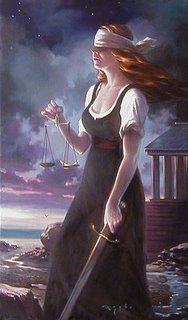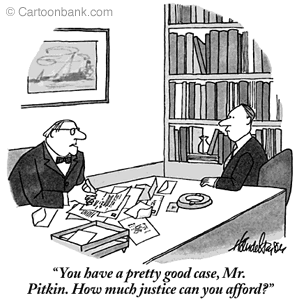
Rhetorical question, right? This is one of those questions teachers' phrase just-so in order to be sure everyone knows the answer. Or is it? I read an interesting quote
attributed to the magazine of the National Organization for Women: "
NOW is the time to drop a boot heel in the groin of patriarchy. NOW IS THE TIME TO FIGHT BACK. NO GOD, NO MASTER, NO LAWS." No laws, huh? Could anyone really espouse such a view? Oddly, the most concise defense of the rule of law that I've read comes from Bill O'Reilly's "Talking Points" for July 20, 2004. (No link--the transcript was e-mailed to me a year ago.) He begins with a discussion of "collective morality," something that, like respect for the rule of law, seems to be passing out of fashion.
One of the reasons the Founding Fathers of this country built Judeo-Christian philosophy into the fabric of the law was because the founders wanted a collective morality in the new nation. That's why vice became crime and why stealing and cheating could get you executed in some places. An early American could die if someone stole his horse or food. Survival depended on cooperation among neighbors.
The founders also knew that the fledgling government couldn't enforce the law. There was no federal police. And only a very disorganized military. The people had to police themselves, basically. Therefore, the founders wanted all Americans on the same page morally.
That's all gone now. There's no collective morality in America any longer. Today each citizen is deciding for him or herself what laws they'll obey and what laws they will not obey. And in some cases, society is actually going along with it.
Of course, the Rule of Law is a good thing. If it sounds cold or impersonal, consider the alternatives. That's not to say our collective faith in the American legal system is not weaker than it once was. It is. I place myself among the 70-odd percent who in a recent poll said they would not trust the legal system to take care of them if they were sued. I would be nervous, to put it delicately.
I know--I've been sued. And I "easily" defeated the baseless charges. But it was a nightmare. In fact, between the suit and the pro-se plaintiff's being thrown out of court, I enjoyed several seasons of nightly crime dramas packed with terror and adventure, each episode ending with my killing someone who threatened me and mine. Nightmares, some would call them--but being woken nightly by the pounding of my young heart was thrilling in its own way.
But
the rule of law is vastly superior to the rule of man. Would you trust Kim Il Sung or Saddam Hussein or Stalin or Mao or Pol Pot? What about King George? Or the Louies? Or Janet Reno? Or John Ashcroft? Or Bill or Hillary or George? Or your boss? It doesn't matter who is in charge, the rule of man is unreliable.
People are unreliable. I've heard good things about some of the people above, but what if Ashcroft just didn't like the cut of your gib? You know, he get's a bad feeling about you, things don't go well, you're nervous when you sit down with him, and you come off as defensive? Even good, well-intentioned men make mistakes. Only the rule of law can be trusted.
And yet, the Rule of Law is under assault all over our nation, not only by the accused, or by politicians, or the press. Often it is those who have sworn to uphold and defend the law who have become its greatest enemies: the lawyers and judges.Like Ashcroft, another man I'm sure I would like personally but whom I fault on this point is Alabama's
Judge Roy Moore. Everything he did in building the Ten Commandments monument and placing it in the courthouse was democratic and entirely legal. But I can't accept the notion that it's okay for the Chief of the state supreme court to defy the orders of a Federal Court. Even if that court was wrong--and it was. 'Time was' when allegiance to the Rule of Law asked more from a man. And I understand about his obeying a higher calling. Like Moore, I'm with the Apostles: we must obey God rather than men. But in this case, I think he was wrong.
More obvious is the naked abuse of power coming out of Travis County.
Ronnie Earle, Travis County DA, may seem to have just made a name for himself when he secured an indictment against Tom DeLay.
Whether DeLay is innocent or not, consider the following: In September of 1993, Earle indicted newly elected
Kay Bailey Hutchison on charges of "official misconduct and record tampering." The judge questioned the admissibility of Earle's evidence, would not let him drop the case, and the senator was acquitted. (But why the charges? Could it have something to do with the fact that this was the first time since Reconstruction that Texas had two Republican senators at the same time?) Then in November, 2004, Earle wrote an op-ed for the NY Times about DeLay--while Earle was still in the middle of his investigation. Fast forward to September, 2005. Earle first secures an indictment against DeLay based on the violation of a statute written
after the violation supposedly occured. Earle has to start over and rearrange his dominoes. September 30, 2005: Second grand jury rejects Earle's attempt, refusing to indict. October 3, 2005: DeLay is finally indicted--after Earle sees three grand juries in five days. Two days later, the foreman of that grand jury admitted that press coverage of the DeLay matter had convinced him of DeLay's guilt before the grand jury ever heard the case. (Earle is also intimately tied up with Ben Barnes, Bill Burkett, and
Dan Rather, the triumvirate of
Rathergate and the forged National Guard documents.)
Set aside for a moment the judges, especially the activists I've discussed elsewhere, and prosecutors motivated by something other than reverence for blind justice. Consider
America's Favorite Senator. The Vietnam POW, the one who claims he never surrendered anything in five years of torture? The man who can Walk the Line better than Johnny Cash (the line between the parties, that is)? McCain has authored an anti-torture bill that over 90 Senators appear ready to endorse. The bill would bind Americans only, obviously. Enemies can continue to torture at will. But we won't. Because, according to McCain (and you can't question him, right?) torture doesn't work. Sure. That's about as convincing as people who swear rape has nothing to do with sex. Nothing at all. Oh yeah, except that it
is sex.... So McCain says torture does not work. And the hundreds of men in Washington who deal in such matters won't come out against him. War hero that he is. (The Viet Cong did manage to have McCain sign something, or so goes the rumor. I have not verified it.) Anyway, torture doesn't work. So we are against it. And what about the doomsday question?
There is a ticking time bomb somewhere, and if we torture Mahmood, he'll tell us where it is and save millions of lives? Some suggest including an exception for such a case. McCain says an exception is not neccessary. Instead, the Senator suggests "
Let's just call all torture illegal, but in the case of a ticking time bomb, we'll be so thankful, no one will prosecute."
HUH?First of all, either way, you have now admitted that of course, torture does work. Right? And we all know it does anyway. Some are stronger than others, but people have their limits.
More importantly (for this discussion) who ever heard of "call it illegal, but we won't prosecute"? What about the rule of law? It's one thing to decide not to prosecute when a set of facts presents itself. But to draft a law with some sort of understanding that you won't enforce it except when you feel like it? Is that even a law at all? Or are we talking about a suggestion, now? And are potential torturers/rescuers of millions supposed to stop and calculate?
Hmm. It's illegal and I could go to jail, and my name and family be ruined. But if Mahmood knows something, I just might be able to escape life in prison.This kind of legislation is preposterous. And the far-reaching ramifactions have been weighed about as carefully as Mr. McCain's last wild ride, campaign-finance reform.
But for me, the real problem is that anyone would consider passing a law that everyone knows is designed to be enforced in some willy-nilly fashion, according to the mood of the country at the time. Hundreds of laws are drafted every year that provide for countless exceptions and special circumstances. But McCain wants the Nobel prize for his black and white rule: all torture is wrong. (He clearly wants
something. There's more going on here than one man's crusade against torture...) Many better-written laws are horrible to read, but at least the exception to the exception to the exception to the exception* can be sorted out and enforced consistently.
There is a reason why we portray Justice as Blind.
Forgive me if I can't get excited about the idea that a law will be passed without including the one exception all parties agree on, and in place of that exception the drafters offer us only their hope that those in power years later will remember the original intent of the framers of that law. Gentlemen, I seem to recall Senator McCain, God rest his soul, once suggested we might not want to prosecute the man who used torture to save the world. After all, without the criminal acts of the defendant, this Capitol would not be standing here today. (*The Stark law, for one, actually has such a set of baffling exceptions.)
Bill O'Reilly concludes:
Martha Stewart is Exhibit A. There's no question she broke the law by lying to the feds about her ImClone trading deal. They had her cold. But because Ms. Stewart herself doesn't consider lying to the feds a crime, she believes she's innocent. President Clinton also took this tack during the Paula Jones fiasco. The city of San Francisco believes it has the right to violate the law [in the same-sex marriage debate] So does the town of New Paltz, New York. Alabama Judge Roy Moore defied federal law over the Ten Commandments display. And the list goes on and on.
As Gandhi demonstrated, there is a time for civil disobedience, but Gandhi wasn't lying or violating any law passed by a legitimate legislature. Martha Stewart mentioned Nelson Mandela in her comments. And she really believes she's a martyr along those lines. Ms. Stewart's vision of right and wrong is her own. And she will defiantly take that vision to prison.
Millions of Americans use drugs, harbor illegal aliens, gamble illegally, and generally do whatever they want, because they don't like the law. That is anarchy. And if the trend continues, America will lose strength.
Martha Stewart is an arrogant, selfish woman. She sees the world only from her narrow point of view. The fact that so many other Americans also subscribe to the "I'll do what I want" philosophy is a strong signal of danger ahead. And that trend can only help those who want to destroy us.
A related note-- Consider The Rule of Law in the Wake of Clinton. Great book and interesting analysis of this problem in more areas than you can imagine; or, it's hard to imagine any president finding so many different ways to assault the rule of law, to flaunt it as though it did not apply to him. But then, it never really did, did it?


